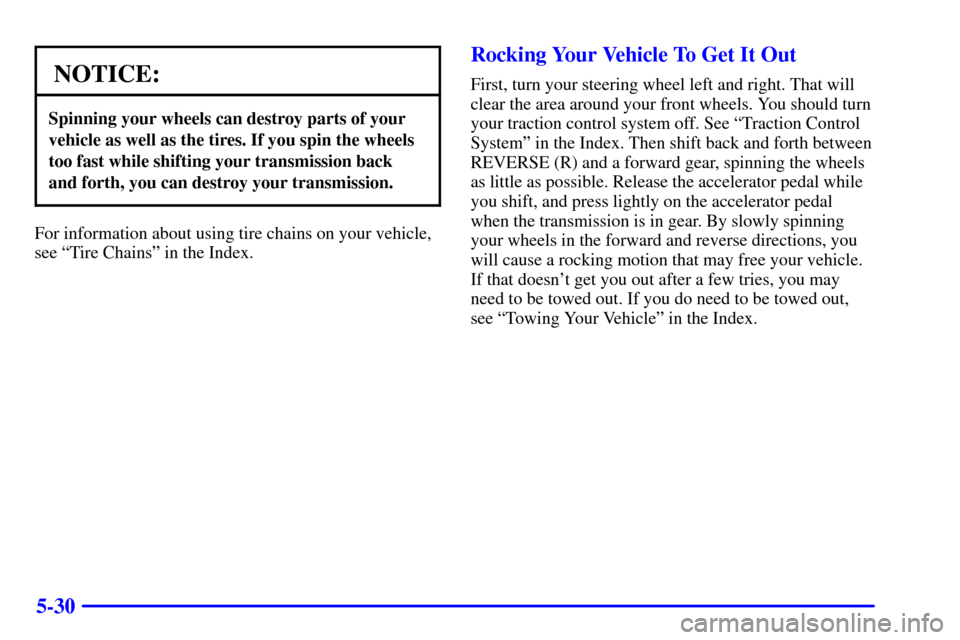Page 250 of 328
5-29
Don't use your spare tire on other vehicles. And don't
mix your spare tire with other wheels or tires. Keep your
spare tire and its wheel together.
CAUTION:
Don't use tire chains on your spare tire. Using
tire chains on your spare tire can reduce your
handling and braking capabilities. You or others
could be injured.
If You're Stuck: In Sand, Mud,
Ice or Snow
In order to free your vehicle when it is stuck, you will
need to spin the wheels, but you don't want to spin
your wheels too fast. The method known as ªrockingº
can help you get out when you're stuck, but you must
use caution.
CAUTION:
If you let your tires spin at high speed, they
can explode, and you or others could be injured.
And, the transmission or other parts of the
vehicle can overheat. That could cause an engine
compartment fire or other damage. When you're
stuck, spin the wheels as little as possible. Don't
spin the wheels above 35 mph (55 km/h) as shown
on the speedometer.
Page 251 of 328

5-30
NOTICE:
Spinning your wheels can destroy parts of your
vehicle as well as the tires. If you spin the wheels
too fast while shifting your transmission back
and forth, you can destroy your transmission.
For information about using tire chains on your vehicle,
see ªTire Chainsº in the Index.
Rocking Your Vehicle To Get It Out
First, turn your steering wheel left and right. That will
clear the area around your front wheels. You should turn
your traction control system off. See ªTraction Control
Systemº in the Index. Then shift back and forth between
REVERSE (R) and a forward gear, spinning the wheels
as little as possible. Release the accelerator pedal while
you shift, and press lightly on the accelerator pedal
when the transmission is in gear. By slowly spinning
your wheels in the forward and reverse directions, you
will cause a rocking motion that may free your vehicle.
If that doesn't get you out after a few tries, you may
need to be towed out. If you do need to be towed out,
see ªTowing Your Vehicleº in the Index.
Page 252 of 328

6-
6-1
Section 6 Service and Appearance Care
Here you will find information about the care of your vehicle. This section begins with service and fuel information,
and then it shows how to check important fluid and lubricant levels. There is also technical information about your
vehicle, and a part devoted to its appearance care.
6
-2 Service
6
-3 Fuel
6
-5 Fuels in Foreign Countries
6
-5 Filling Your Tank
6
-8 Filling a Portable Fuel Container
6
-8 Checking Things Under the Hood
6
-11 Engine Oil
6
-15 Engine Air Cleaner/Filter
6
-19 Automatic Transmission Fluid
6
-19 Rear Axle
6
-20 Engine Coolant
6
-24 Surge Tank Pressure Cap
6
-24 Power Steering Fluid
6
-25 Windshield Washer Fluid
6
-26 Brakes
6
-30 Battery6
-30 Bulb Replacement
6
-37 Wiper Blade Replacement
6
-38 Tires
6
-47 Appearance Care
6
-49 Care of Safety Belts
6
-50 Cleaning the Outside of Your Vehicle
6
-52 Cleaning Aluminum or Chrome-Plated
Wheels (If Equipped)
6
-53 Underbody Maintenance
6
-54 GM Vehicle Care/Appearance Materials
6
-55 Vehicle Identification Number (VIN)
6
-55 Service Parts Identification Label
6
-56 Electrical System
6
-63 Replacement Bulbs
6
-63 Capacities and Specifications
6
-64 Normal Maintenance Replacement Parts
Page 270 of 328

6-19
Automatic Transmission Fluid
It is not necessary to check the transmission fluid level.
A transmission fluid leak is the only reason for fluid
loss. If a leak occurs, take your vehicle to the dealership
service department and have it repaired as soon as
possible. You may also have your fluid level checked
by your dealer or service center when you have your
oil changed.
Change both the fluid and filter every 50,000 miles
(83 000 km) if the vehicle is mainly driven under one or
more of these conditions:
�In heavy city traffic where the outside temperature
regularly reaches 90�F (32�C) or higher.
�In hilly or mountainous terrain.
�When doing frequent trailer towing.
�Uses such as found in taxi, police or delivery service.
If you do not use your vehicle under any of these
conditions, the fluid and filter do not require changing.NOTICE:
We recommend you use only fluid labeled
DEXRON�-III, because fluid with that label is
made especially for your automatic transmission.
Damage caused by fluid other than
DEXRON
�-III is not covered by your new
vehicle warranty.
Rear Axle
When to Check Lubricant
Refer to the Maintenance Schedule to determine how
often to check the lubricant. See ªPeriodic Maintenance
Inspectionsº and ªScheduled Maintenance Servicesº in
the Maintenance Schedule booklet.
Page 309 of 328
6-58
Instrument Panel Fuse Block (Driver's Side)
The fuse block is located below the steering wheel on
the driver's side. Using a screwdriver, loosen the two
trim fasteners under the trim panel and pull the trim
panel away from the instrument panel to access.
Fuse Usage
1 RH and LH Front Side Door
Window Regulator Motor, LH
Front Side Door Window Switch
2 Stoplamp Switch, Cruise Control
Release Switch
3 Automatic Transmission Range
Switch, Automatic Transmission
Control Indicator, Power Steering
Control Module, Hazard Warning
Switch, Automatic Transmission
Winter Mode Switch, Transmission
Control Module (TCM)
Page 310 of 328

6-59
Fuse Usage
4 RH and LH Rear Seat Cushion
Heater Relay, Rear Sunshade
Motor, Accessory Power Outlet
5 Transmission Control Module
6 Radio Speaker Amplifier
7 RH and LH Rear Side Door
Window Regulator Motor
8 Headlamp Switch, Turn Signal
Switch, Horn Relay, CD Changer,
Multifunction Relay
9 Windshield Wiper Motor and
Relay, Windshield Wiper and
Windshield Washer Switch
10 Body Control Module (BCM),
Heater Water Auxiliary Pump,
Fan Control Relays, Auxiliary
Water Pump Relay
11 Heater and A/C Control, RH and
LH Outside Rearview Mirrors
12 Hazard Warning Switch,
Instrument Cluster, Data Link
Connector (DLC), Stoplamp
Switch, Gage Cluster,
Heater and A/C Control.Fuse Usage
13 Remote Control Outside Rearview
Mirror Switch, A/C Compressor
Relay, Coolant Fan Test
Connector, A/C Load Switch
14 Cellular Telephone, RH and LH
Windshield Washer Nozzles,
Driver and Passenger Heated Seat
Switch, Heater and A/C Control,
Heated Outside Rearview Mirror
and Rear Window Defogger Relay
15 Rear Suspension Leveling Air
Compressor Relay, Instrument
Cluster, Gage Cluster, Cruise
Control Switch, Headlamp Switch,
Multifunction Relay, Passenger
and Driver Heated Seat Relay,
BCM, Sunroof Actuator,
Automatic Level Control Sensor,
RH and LH Heated Rear Seat
Switch, RH and LH Heated Rear
Seat Cushion Relay, Driver Seat
Adjuster Memory Module, LH
Front Side Door Window Switch,
Inside Rearview Mirror
Page 311 of 328

6-60
Fuse Usage
16 Cigarette Lighter
(Front and Console)
17 Horn #1 and #2
18 Fuel Pump
19 Electronic Brake/Traction
Control Module
20 Passenger and Driver Heated
Seat Relay
21 Daytime Running Lamp (DRL)
Relay, LH High
-Beam
Headlamp Relay
22 Headlamp Switch,
LH Low
-Beam Headlamp
23 LH Parking Lamp and Turn Signal
Lamps, LH Rear Sidemarker
Lamp, Multifunction Relay, LH
Stoplamp and Taillamp
24 Lifting Magnet, BCM,
Gage Cluster
25 Sunroof ActuatorFuse Usage
26 Headlamp Switch, RH and LH
Front Sidemarker Lamp, Middle
Taillamp, RH and LH Rear
License Plate Lamp, Radio,
Automatic Transmission Control
Indicator, Heater and A/C Control
27 Automatic Level Control Sensor,
Rear Suspension Leveling Air
Compressor and Relay
28 Door Lock Relay
29 Multifunction Relay,
OnStar
� System
30 RH Parking Lamp and Turn Signal
Lamp, RH Rear Sidemarker
Lamp, RH Stoplamp and Taillamp
31 RH Low
-Beam Headlamp Turn
Signal Switch
32 RH High
-Beam Headlamp Relay
33 Blower Controller,
A/C Compressor Relay
34 Heated Rear Window
Defogger Relay
35 Passenger Seat Adjuster
Switch, Driver Seat Adjuster
Memory Module
Page 314 of 328

6-63
Fuse/Relay Usage
5 A/C Compressor Relay (K60)
6 Fan Control Relay (K87)
7 Fan Control Relay (K26)
8 Fuse 50
9 Fan Control Relay (K28)
10 Engine Controls Power
Relay (K43)
15 Fuse 40 (A) Fuse 52 (B)
16 Connector C110
17 Coolant Fan Test Connector
Fan Control
18 Fuse 42 (A), Fuse 49 (B)
19 Fan Control Relay (K52)
20 Fuel Pump Relay (K44)
29 Fuse 43Replacement Bulbs*
Application Bulb Number
Composite Headlamps
Inner High Beam 90512338. . . . . . . . . . . . . . . . . . .
Outer Low Beam 90512338. . . . . . . . . . . . . . . . . . .
Front Turn Signal Lamp 90487485. . . . . . . . . . . . . . .
Taillamp 90002521. . . . . . . . . . . . . . . . . . . . . . . . . . .
*For replacement bulbs not listed here, please consult
your dealer.
Capacities and Specifications
The following approximate capacities are given in
English and metric conversions. Please refer to
ªRecommended Fluids and Lubricantsº in the
Maintenance Schedule booklet for more information.
Transmission 7.0 quarts (6.6 L). . . . . . . . . . . . . . . . .
Engine Crankcase
Oil Change With Filter 6.0 quarts (5.75 L). . . . . . .
Engine Cooling System 10.57 quarts (10.0 L). . . . . .
Fuel Tank 16.0 U.S. gallons (60.56 L). . . . . . . . . . . .
Refrigerant See refrigerant charge. . . . . . . . . . . . . . . .
label under the hood.
All capacities are approximate. When adding, be sure to
fill to the approximate level, as recommended in this
manual. Recheck fluid level after filling.